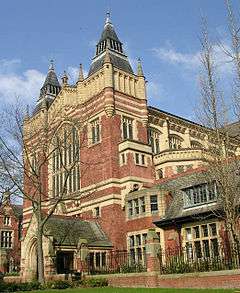Centre for History and Philosophy of Science, University of Leeds
The Centre for History and Philosophy of Science is a research institution devoted to the historical and philosophical study of science and technology, based in the Department of Philosophy, at the University of Leeds in West Yorkshire, England. The Centre – previously known as the Division of History and Philosophy of Science, which was founded in 1956 – is one of the oldest institutions of its kind in the world. Throughout its history, the Centre has been home to many of the leading historians and philosophers of science who have shaped our understanding of scientific activity and how it shapes and is shaped by wider society.
Early history and expansion
The key figure in establishing history and philosophy of science (HPS) as a discipline at Leeds was the philosopher of science Stephen Toulmin, who was appointed Professor of Philosophy at Leeds in 1954 and head of department in 1956. Whilst Thomas Kuhn is often seen as the founder of the modern field of history and philosophy of science, Toulmin had argued for an integration of philosophy of science and history of science some nine years before Kuhn published his famous work, The Structure of Scientific Revolutions.[1]
In the 1970s, historian of genetics Robert Olby became a leading figure in the Division through his book Path to the Double Helix,[2] which showed how the 1953 discoveries of Crick and Watson were rooted in the work of two University of Leeds scientists: the creator of molecular biology, William Astbury, and the Nobel prizewinning inventor of X-ray crystallography, William Henry Bragg.
Diversification and expansion in the 1990s
From 1993 onwards, Leeds HPS took a new direction as several new specialist appointments were made in the philosophy of science, the history of medicine and the history of technology. Professor Steven French[3] came to Leeds in 1993, having previously worked in Brazil and the USA.
Adrian Wilson,[4] Lecturer in History of Medicine, came to the Division under a Wellcome University Award. Dr Wilson's main research focus is seventeenth- and eighteenth-century midwifery/childbirth, particularly with reference to male and female roles in delivery – a subject he explored in his book The Making of Man-Midwifery (1995).
In 1994, Graeme Gooday[5] was appointed to teach courses on the history and philosophy (especially the ethics) of technology.
Jonathan Topham[6] arrived in Leeds in 1999 as an AHRB Institutional Fellow for the Science in the Nineteenth-Century Periodical (SciPer) Project,[7] having previously worked on the Darwin Correspondence Project and at the University of Cambridge. The work of the SciPer Project reflects Dr Topham's wide interest in the production and reading of scientific publications in nineteenth-century Britain, a subject on which he has published a number of widely cited articles. Topham's other main research focus is on science and religion, and he has published valuable articles on natural theology and theologies of nature in nineteenth-century Britain. As a lecturer in history and philosophy of science since January 2005, Topham has helped develop a new Masters programme in science communication in collaboration with the University of Leeds's Institute of Communication Studies.[8]
After completing his postgraduate studies at Cambridge, Dr Gregory Radick[9] was appointed as lecturer in the HPS Division in 2000 during Professor Cantor's sabbatical, becoming a permanent member of staff in 2003.
Further information
- Graeme Gooday, 'History and Philosophy of Science at Leeds', Notes and Records of the Royal Society 60 (2006), 183–192.
References
- Toulmin, Philosophy of Science: An Introduction (1953)
- Robert Olby, Path to the Double Helix (1974).
- Steven French, University of Leeds, UK.
- Adrian Wilson, University of Leeds, UK.
- Graeme Gooday, University of Leeds, UK.
- Jonathan Topham, University of Leeds, UK.
- Science in the Nineteenth-Century Periodical (SciPer) Project, University of Leeds, UK.
- Communication Studies, University of Leeds, UK.
- Gregory Radick, University of Leeds, UK.
